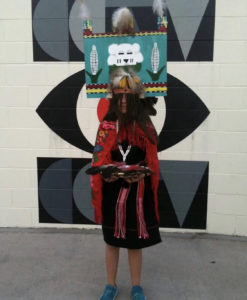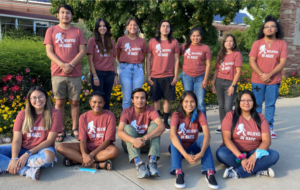Students often choose academic and career fields based on their experiences. For Rasa Humeyumptewa, this includes the cultural context that she and her family experience as part of the Hopi Tribe.

When we met, Humeyumptewa introduced herself in the Hopi language: “Lolomani, Nu Yoyokmana yan maa’tsiwa niwq Rasa Humeyumptewa yan pahan maa’tsiwa, niwq Taawungwu niwq awyant Tsuu’yungya.”
In English, Humeyumptewa’s introduction is: “Hello, I am named Yoyokmana and I am named Rasa Humeyumptewa in English. I am sun clan and related to snake clan.”
Humeyumptewa is a fourth-year student at Colorado State University majoring in Clinical and Counseling Psychology in the Department of Psychology with a minor in Indigenous Studies, in the Department of Ethnic Studies.
Humeyumptewa is from Denver, Colorado, and is also an enrolled member of the Hopi Tribe, based in Arizona. Specifically, Humeyumptewa said, “I am a member of sun clan, related to the snake clan, from the village of Hotevilla.”
The clan system of the Hopi people is matrilineal, meaning they trace their ancestry through generations of women.
Humeyumptewa explained that “for me, I inherited the first clan, sun, and got my relation to the snake clan through my clan mother.”
More information on the Hopi clan system can be found through the Hopi Cultural Preservation Office.
Focusing on culturally sensitive counseling
Humeyumptewa has had an interest in psychology throughout her life. Originally, she hoped to become a criminal profiler.
“However, I began to think about what impact I wanted to make in the community and in the world,” she said.
After some reflection, Humeyumptewa rethought her goals.
“I realized that I really wanted to become a counselor and see the change I could make firsthand,” she said.
In the near future, Humeyumptewa plans to attend graduate school and potentially work towards receiving a Psy.D., a type of doctorate degree that emphasizes psychological research and application.

“I hope to eventually further the research on the effects of intergenerational trauma on Native populations or also the impacts of culturally sensitive therapy.”
Culturally sensitive therapy focuses on the therapist having an understanding of their client’s cultural background, ethnicity, and belief system, as well as an understanding of the client as a person.
Humeyumptewa has seen the benefits of culturally specific therapy services first-hand, and ultimately strives to bring more of these practices to the Hopi Tribe, especially to adolescents and young adults.
“One culturally specific therapy I would love to research in the future, as well as possibly practice, is agricultural and horticulture therapy,” she said.
Humeyumptewa hopes to bring this type of counseling to facilities such as Indian Health Services.
The Indian Health Services is a United States government agency that provides medical and public health services to federally recognized Native Tribes.
Indigenous community on campus
Along with her studies, Humeyumptewa is very involved with the Native American Cultural Center here at CSU.
Humeyumptewa has been actively involved with the NACC office since her second year.
“I first started my involvement by volunteering to help with the Powwow and the exhibition that normally happens the day before the powwow on the campus plaza,” she said.
Since then, Humeyumptewa has become a member of the Women’s Circle and a North Star Peer Mentor at the NACC office. Both of these experiences have allowed her to make meaningful connections and friendships with her community, especially with other Indigenous women and Native students just starting at CSU.
“Once I saw how much the NACC office was doing and what opportunities were being made for Native students, I was excited to get involved and also be a part of the community,” she said.

Humeyumptewa’s involvement with the NACC office has already given her lots of insight into her future goals.
“I have been able to see what impacts of having designated spaces and programs for Native students can do for them in terms of both support and overall well-being,” Humeyumptewa said.
As a Peer Mentor with NACC, Humeyumptewa performs outreach to connect with new Native American students and help ease their transition to college and life at CSU.
Tiffani Kelly, the assistant director of NACC, supervises Humeyumptewa in her role as a Peer Mentor.
Kelly acknowledged that in the past year and a half, the Peer Mentors had the unique challenge of adapting their engagement with the ever-changing COVID-19 policies.
Despite the challenges, Kelly said, “Rasa has gone above and beyond trying to find ways to reach out to students and build community. She’s really blossomed into an amazing leader and student activist.”
The experience has helped Humeyumptewa understand the specific kind of support that Native young adults need across various contexts and settings.
“Helping people has always been important to me; helping them to get through tough times and also just helping people reframe their thinking in a variety of situations that may be beneficial,” Humeyumptewa said.
About Rams Shape Science: Meet some of the extraordinary students, faculty, and staff in the College of Natural Sciences who are shaping the future of science and our society.